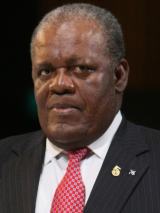
Nassau, Bahamas – The Ministry of The Environment of the Commonwealth of The Bahamas in conjunction with the Bahamas National Trust and the Harvard University Graduate School of Design (GSD) are holding a one day conference at the Sheraton Nassau Beach Resort on Friday, July 8, 2011. An international and local group of practitioners, scholars, and legislators will address current environmental strategies and imagine future scenarios for the sustainable development of the Exumas, the chain of Bahamian islands that includes the Exuma Cay Land and Sea Park. The intention for this first exploratory event is to identify key issues and goals for a possible multiyear research initiative that will analyze the Exumas from environmental, social, economic, design, and planning perspectives.
The following is the Prime Minister’s remarks:
Rt. Hon. Hubert A. Ingraham
Prime Minister
A Sustainable Future for the Exumas
Environmental Management, Design and Planning Conference
Friday 8 July, 2011
I am pleased to join you for the launch of this Environmental Management, Design and Planning Conference and to acknowledge the Government’s collaboration with The Bahamas National Trust and the Harvard University Graduate School of Design in the realization of this meeting.
This Conference provides the opportunity for us to undertake activities to educate and inform citizens on important matters related to environmental protection and conservation. And, it is supportive of planning and management initiatives underway in the Ministry of the Environment in fulfillment of the standards and requirements of the Planning and Subdivisions Act, 2010.
Ladies and Gentlemen:
The natural environment, inclusive of its conservation and enhancement, has long been of importance to the Government of The Bahamas as evidenced by the fact that the establishment of the Exuma Land and Sea Park, the oldest park of its kind, dates back to 1959. Additionally, this Park has been managed since 1959 by the Bahamas National Trust, a quasi Non-Governmental Organization established by an Act of Parliament. In 1986, new by-laws for the Exuma Land and Sea Park declared the Park as a “no-take zone” or “marine fisheries reserve”.
The Sea Park is unparalleled in beauty with pristine biodiversity – a true treasure. Indeed, it is truly a bountiful treasure of marine resources and a replenishment area – continually providing young conchs, groupers and crawfish to the waters surrounding this national treasure.
It is therefore appropriate that the Exumas, the home of the Exuma Land and Sea Park, has been selected to benefit from the knowledge, expertise, experience and advice of all of you gathered here today. Effective planning and responsible environmental management will be critical to the future development of the Exumas and indeed to all of our islands.
Ladies and Gentlemen:
Planning for the future development of The Bahamas presents the challenge of fostering the well being of the people while at the same time preserving the natural beauty and unique ecology of our archipelago. Notwithstanding this challenge, much has been accomplished.
When my Government first came to office in 1992, we began a dialogue with concerned and interested environmentalists with a view to enhancing the conservation of our natural environment, an extremely vital component of our tourism product.
During our three non-consecutive terms in office, my Government has maintained its commitment to ensuring responsible environmental stewardship. We have sought to advance the national dialogue, to embrace many facets of environmental protection and conservation, and to adopt initiatives which would best serve the interests of the Bahamian people.
We developed and adopted policies to promote sustainable development of our country’s resources, and we enacted legislation necessary for the implementation of our policy for environmental sustainability.
Specifically, some of the initiatives included the following:
The establishment The Bahamas Environment Science and Technology (BEST) Commission whose mandate was to coordinate the Government’s response to important international environmental initiatives and to develop a protocol requiring Environmental Impact Assessments on all proposals for major new developments in The Bahamas. Originally required for foreign direct investments only, the EIA protocol was subsequently expanded to include all significant developments.
The enactment of Laws and Regulations which
created a protected tree list and put a set of rules in place for dealing with protected trees;
outlawed long-line fishing; and
prohibited the fishing for Nassau Grouper during spawning aggregations.
In 1999 we caused an inventory to be undertaken of the 40 creek systems in The Bahamas that had become badly degraded and in desperate need of rehabilitation and management, and thereafter spearheaded the study of degraded creeks and established the National Creek and Wetlands Restoration Initiative.
In early 2002 we doubled the size of national parks managed by the Bahamas National Trust and in 2009, to mark the 50th Anniversary of the National Trust, we further expanded the National Park system to include additional important marine areas in Andros and around the Conception Island Land Park and created a new national park at Fowl Cay in the Abacos.
Since May, 2007, we have increased our direct budgetary contribution to the Bahamas National Trust ten-fold to $1 million annually, in recognition of its expanded responsibility as a non-profit NGO, for the management of an enlarged national park system.
We enacted the Planning and Subdivisions Act, 2010 of which I referred to earlier, and which calls for the development of Land Use Plans for each of our islands.
Our new Forestry Act, 2010 is designed to assist the sustainable development and management of our forestry resources.
We have also amended the Bahamas National Trust Act.
Earlier this year, we banned turtle fishing and, just this week we approved new regulations prohibiting commercial exploitation of any shark species in our waters in recognition of the importance of top predators like sharks, in sustaining healthy ecosystems and fish populations. The extensive international media coverage of this major accomplishment attests to the fact that what we did domestically is of global significance.
Outside of The Bahamas, we have expanded funding to the regional protected area system markedly through the sponsorship with other regional governments, The Nature Conservatory, and other donor countries and international organizations in the Caribbean Challenge.
Ladies and Gentlemen:
We are cognizant that communities exist adjacent to national parks and other sensitive ecosystems and, consequently, those communities impact these systems. Therefore, to effectively plan for those impacts, we need to produce planning principles for development to guide present and future decisions as we seek to foster sustainable communities.
The Exuma Land and Sea Park is home to a number of private islands whose private ownership pre-dates the creation of the Park, and it is bordered by a number of other small communities. The existence of private property in and adjoining the Park are perfect examples of why we need to ensure sustainable development and land planning for the Exumas and, by extension, for all of our islands.
Privately owned islands and cays in the Park have, over the years, been the cause of expressed concern by (i) other owners in the Park, (ii) the Bahamas National Trust which is responsible for the management of the Park and the enforcement of its by-laws, (iii) the wider Bahamian community, and (iv) by other environmentally conscious citizens
Concerns have ranged from fear of damage to the seabed as the result of dredging, the size and scale of proposed development within or near the Park’s boundaries, the introduction of commercial activity in the Park, the capacity to enforce the by-laws (rules) of the Park, and the need to develop and enforce new rules.
These concerns indicate the need for clear, easily understood and enforceable user protocols which identify and define sustainable practices, and for required sound planning principles inclusive of density rules, building standards and maintenance.
Similar concerns have also been expressed about developments on other islands such as at Clifton and the Albany Resort in southwestern New Providence; Bimini Bay in the Biminis; and Baker’s Bay, Abaco; just to name a few.
Ladies and Gentlemen,
It is certainly not the Government’s policy to impede development but it has become necessary to require that developments in our country, particularly in communities proximate to National Parks and protected areas, be harmonious with the environment and for them to be governed by the highest standards and best practices, so as to accommodate desired and appropriate use.
Ladies and Gentlemen:
Today with the help of the Harvard Graduate School of Design we begin this process for the Exumas. This multi-year initiative will analyze the Exumas from environmental, social, economic design, and planning perspectives and will provide a model for land use plans in The Bahamas.
We have made significant strides as a corporate community along with our international partners to ensure the conservation and preservation of the stunning beauty and natural environment of the archipelagic jewels of the Bahama Islands. It is therefore my hope that this undertaking and the ongoing collaboration will enable us to accomplish even more.
I wish you the best, thank you for your participation, and look forward to the fruits of your collaboration.








all this **** ing-rum doing and all these nice hard working people getting kill. look like it pays to be a peace a ****!
The FNM caring about the environment??? What a joke.
They are obviously feeling guilty now about allowing the dredging in our pristine park. Kind of late for that. It’s already ruined. All this rain has produce some serious limestone run-off from Bell Island that is flowing with the currents and bleaching everything in sight. FNM don’t care about the environment, they only care about the Aga Khan and company paying them off. Why are we paying for studies in the Exuma Cays when they are practically all owned by foreigners? Let these rich owners pay for it. David Copperfield, Aga Khan, Johnny Depp, Tyler Perry and many more, all together worth billions. Why should we pay for it and we can’t even step foot on a nice beach there. They are all private.
Private ownership pre-existed the Park??? Bullshit!
That doesn’t give anyone the right to destroy it. The point is, it is now a National park. The govt. needs to buy back these islands and cays and preserve them for Bahamians. In another 15 years or less, the Exuma Cays will look like the Florida Cays. All the pretty colours will be gone. Forever! Thanks to the FNM. I haven’t even started talking about all the garbage that is blown off these islands and from all these crusing boats and is floating around or lying on the bottom. Serious, these foregners have ruined our Exumas. Actually, they don’t even look like the Exumas anymore. For all you nature-loving Bahamians that have never seen the Exuma Cays, sorry, but you missed it when it was pristine and beautiful.
Hey Bp were you guys at this openning of this thing today, with Papa losting his mine cussing at the bahamasian ppl, this man must be losting his head and forget that he’s working for the ppl hey, we got to get this DEM MAN from around here.
Didn’t you know he’s not a man he’s a demon spawned from the seed of the devil himself. How else can you explain those legendary red eyes of his and that trademark scowl?
Comments are closed.